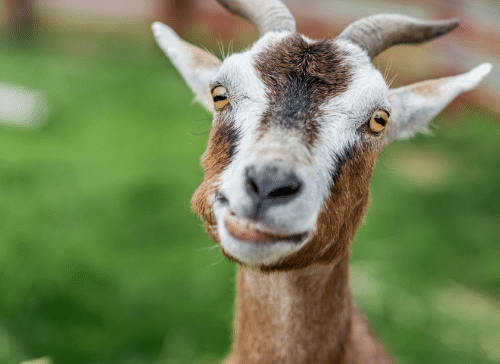Dumb GoatDomestic Cutie

Areas of expertise
- Are a Great Meat Source
- Produce Fiber
- Produce Milk and Cheese
- Clear Land. Goats are living weed eaters
- Make good Manure
Education
- MBA, Philadelphia Zoo University
- BS, University of Woodland Park Zoo
- PHD, Denver Zoo University
The domestic goat or simply goat (Capra hircus) is a domesticated species of goat-antelope typically kept as livestock. It was domesticated from the wild goat (C. aegagrus) of Southwest Asia and Eastern Europe. The goat is a member of the animal family Bovidae and the subfamily Caprinae, meaning it is closely related to the sheep. There are over 300 distinct breeds of goat. It is one of the oldest domesticated species of animal, according to archaeological evidence that its earliest domestication occurred in Iran at 10,000 calibrated calendar years ago. Goat-herding is an ancient tradition that is still important in places like Egypt. Goats have been used for milk, meat, fur, and skins across much of the world. Milk from goats is often turned into goat cheese.
There are over 300 distinct breeds of goat. It is one of the oldest domesticated species of animal. There are various breeds which weight ranges vary from 20Kg (45 lb) to 140Kg (300 lb).
Fascinating Goat Facts:
1. A baby goat is called a kid, but did you know that a goat giving birth is said to be “kidding”?
2. Goats are sociable animals and therefore become depressed if they are separated or isolated from their companions, however they are not flock-orientated like sheep.
3. They are one of the cleanliest animals and are much more selective feeders than cows, sheep, pigs, swine and even dogs.
4. Goats are very intelligent and curious animals. Their inquisitive nature is exemplified in their constant desire to explore and investigate anything unfamiliar which they come across.
5. They communicate with each other by bleating. Mothers will often call to their young (kids) to ensure they stay close-by. Mother and kid goats recognise each other’s calls soon after the mothers give birth.
6. Goats can be taught their name and to come when called.
7. They are very picky eaters. They have very sensitive lips, which they use to “mouth” things in search of clean and tasty food. They will often refuse to eat hay that has been walked on or lying around loose for a day.
8. Goats use the sneeze sound as an alarm. They use a sneeze to warn each other of danger, whether real or imagined.
9. They are extremely intelligent and curious and are very often not given credit for being the smart and loving creatures they actually are.
10. Goats dislike water and would rather leap over streams and puddles than step in them.
